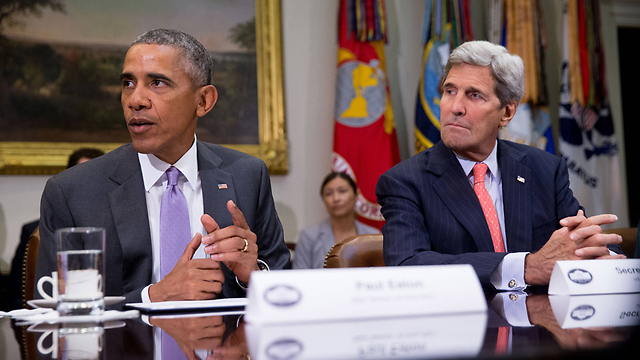
'A threatening situation has developed, and there is need for external help'
צילום: AP
Only US can mediate in Israel
Analysis: Obama, Kerry want to put out the fire but also prevent the next flare-up; Netanyahu, Abbas must acknowledge that price of conflict is higher than that of an agreement, otherwise conflict can only be postponed.
The United States enters active mediation in the Israeli-Arab conflict in two cases: A threat and an opportunity. The threat is reflected in ongoing violence and use of force which may expand to other areas and aggravate the conflict, like in the big wars (Yom Kippur, the first Lebanon War and the Second Lebanon War) and Gaza operations.

An opportunity is created when the region experiences changes which appear mature enough for a diplomatic initiative. For example, in 1991, after the first Gulf War, when the George H. W. Bush administration initiated the Madrid Peace Conference. The Obama administration felt such an opportunity had been created in light of the dramatic changes in the region following the Arab Spring and the need to deal with the Iranian nuclear program, and so Secretary of State Kerry worked to advance talks and an agreement which failed.
Today, a threatening situation has developed and there is a need for an external element to help put out the fire. The US is the only element which can mediate; there is no other. Israel has asked for such aid, but it's complicated.
The US warned of violent outbursts due to the stalemate and lack of negotiations. As far as the US is concerned, the current violence confirms its predictions. The poison which has infiltrated US President Barack Obama's relationship with Prime Minister Benjamin Netanyahu following the battle over Iran has an effect as well and is reflected in the statements made by Obama, Kerry and the US State Department's spokesperson.

Obama and Kerry. As far as the US is concerned, the current violence confirms its predictions. (Photo: AP) (צילום: AP)
At first, Obama ignored the violence, Kerry mentioned the settlements again as an obstacle to the negotiations, while his spokesperson claimed that Israel had violated the status quo on the Temple Mount, which led to the outburst of the wave of violence, and criticizes Israel for using excessive force. These two claims are groundless, and the spokesperson did take them back, but they point to the state of mind in Washington. Obama eventually condemned the violence and said Israel had the right to defend itself, but called on both sides to lower the flames.
In the past few years, Obama has often use statements like "Israel has the right to defend itself" and reiterated that the relationship between the US and Israel is "unshakable" and "unbreakable." But the need to repeat these statements and declarations shows that they are not obvious and that they are meant to cover disagreements.
Obama and Kerry are not only interested in putting out the fire, but in preventing the next flare-up as well. Kerry seeks to resume the Israeli-Palestinian negotiations. His and Obama's comments, which attempt to convey a certain symmetry between the two sides' responsibility for the violence, stem from the anger at Israel but also from a desire to look like decent mediators, although the Palestinians think the Obama administration is biased in favor of Israel.
Obama and Kerry think that the situation is suitable for resuming the mediation and negotiations. It's not just the violence, but also the European Union's boycott threats and the French initiatives in the UN Security Council to deploy observers on the Temple Mount and adopt a resolution demanding that Israel withdraw from Judea and Samaria within two years and calling for the establishment of a Palestinian state within the 1967 borders.
It's unclear whether Obama is prepared to thwart these initiatives. While all these are considerations Netanyahu must take into account, he is facing serious coalition obstacles. Obama and Kerry would like to see a change: Removing Naftali Bennett and his party from the coalition and bringing in Isaac Herzog and the Zionist Union instead.
Countries and nations tend to reach peace agreements after conflicts in which they pay higher prices than the prices of the agreements. That's what happened to Israel and Egypt after the Yom Kippur War. I doubt this is the way Netanyahu and Palestinian President Mahmoud Abbas see things, and without such an acknowledgement I doubt they will be able to do more than locally and temporarily put out the fire.
Prof. Eytan Gilboa is an expert on the United States and the director of the Center for International Communication at Bar-Ilan University.










